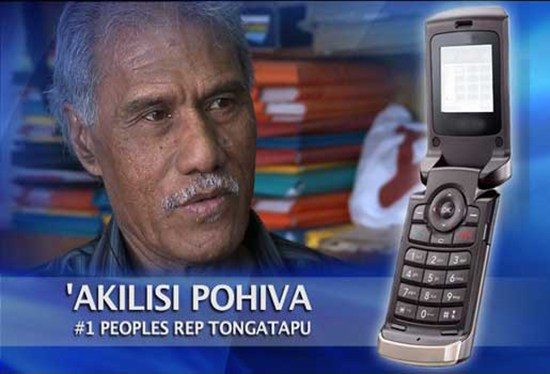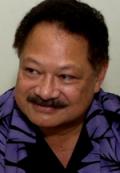
Kalafi Moala writes that Tonga’s political reform agenda is about to enter a final staging with Tonga’s longest serving parliamentarian.
PROFILE: An old political veteran is about to make this year’s parliamentary election in Tonga a final staging for perhaps the most radical challenge to the powers that be concerning power sharing and democracy.
At age 72, ‘Akilisi Pohiva is probably one of the most well known politicians and resilient reformers in the Pacific region. He is an old warrior that simply won’t give up until he gets what he believes is God’s destiny for his home country.
And in Tonga, it is to reform into a fully fledged democracy, not like the current one which he says is incomplete and will not work.
He points out the fact that the current government, the first under the 2010 reform regime, is facing all kinds of challenges, and has been unable to make things work. There is still incredible injustice in the system, he says.
The minority is still ruling the majority; power sharing, separation and balance of power, is the same as it ever was, according to Pohiva.
Add to that continually rising corruption, a public debt crisis, and the recent cyclone devastation of the Ha’apai islands, and you’ve got an economy in trouble and a political leadership crisis looming.
But what has really changed in the 2010 reform? The focus of that reform was that the Monarch laid down his power to appoint the executive – the prime minister and cabinet ministers, which was something Pohiva’s pro-democracy movement campaigned for over a period of over 20 years.
Constitutional changes
The Constitution was amended in 2010, giving parliament the power to elect the prime minister, and the prime minister would then appoint his own cabinet.
The Privy Council, the highest executive authority then, which consisted of the cabinet with the king presiding, was reconfigured into an advisory council of “law lords” with no political power, appointed by the Monarch to advise him.
The prime minister has the chief executive power to run the government with the ministers he appoints.
But the difficulty, says Pohiva, is that even though seats for people’s representatives were increased from 9 to 17, the number of seats for nobles remained the same. And that’s where the problem lies.
The nine (9) nobles’ seats represent 33 nobles, and the seventeen (17) people’s seats represent 108,000 people. The maths here is not right, according to Pohiva. The power of representation is not balanced. How can you have a democratically elected parliament when nine of the 26 seats are assigned exclusively for just 33 nobles?
In other words, if the 9 nobles, who are often united in their stand, could persuade just 5 people’s representatives to join them, they will have a majority, and will be able to select whoever it is to be prime minister.
Most likely it would be a noble. And those he selects to be on his cabinet, in other words, the government, would be nobles or those who sympathise with the nobility.
Reform regime
This is of course what happened in the last election, the first under the new reform regime. Lord Tu’ivakano, a noble from Tongatapu, was elected as prime minister, and he then formed a government of 12 ministers that will end its term by the end of the year.
This could not have happened without five of the people’s representatives choosing to side with the nobles. These were either moderates or anti-democracy people’s representatives.
Pohiva who was elected with an overwhelming majority from his No 1 district in Tongatapu, and who was leader of the Pro-democracy Party, should have been the prime minister if it was not for the domination of parliament by the nobles.
Pohiva’s supporters could not believe that a system that was supposed to have been changed ended up with a noble and a minority representation still ruling Tonga.
That opportunity to have a pro-democracy government ruling Tonga was missed, but Pohiva is now campaigning more than ever for a strong majority of pro-democracy party members to occupy the 17 seats for the people.
Pohiva is still robust in his reform thinking, and is about to stand as parliamentarian candidate for the 9th time over the past 27 years, having never lost an election. In fact he has won every election with overwhelming majority, including the most recent in 2010 in a partially reformed structure.
He is Tonga’s longest serving parliamentarian - for 28 years by the end of the current parliament’s sitting in November.
Full democracy?
If the history of Tongan elections would repeat itself, there is the strong likelihood, he would be Tonga’s next prime minister, and his government would be the first fully pro-democracy government for the island kingdom.
The hot conversation going on in Nuku’alofa today is that the nine noble seats must be abolished. Why have nine seats for 33 nobles? Why can’t all the members of parliament be people’s representatives elected by the people?
If a noble wants to enter parliament he will need to run as a people’s representative.
This change may not happen before November’s election but it promises to be the key issue for political reform in the next several years, definitely before the 2018 election.
And this is why Pohiva and his party must win the majority seats for parliament in November. Only then would there be hope of further reform to make Tonga become truly democratic.
The same reason for the abolition of nobles’ seats in parliament would apply to the proposal for special seats assigned to women. If a woman wants to run, she will need to be a candidate as a people’s representative. Some of the women who have entered parliament in previous years won elections, not as women but as people’s representatives.
As it is with the nobles, there should not be special seats set apart for women, or for any other special group. Everyone runs as a representative of the people, elected by the people. This is the stand made by Pohiva and his pro-democracy party.
It is interesting that the nobles are in support of women getting their own assigned seats in parliament. Pohiva believes this move, which is most unlikely to be accepted, is simply an attempt to justify the nobles retaining their own assigned seats.
Pohiva was named man of the year by Islands Business Magazine in 1990, and was awarded in 2013 the International Defender of Democracy Award, presented to him in Columbia. This article was first published on the PiPP website and has been republished with the permission of the author.



